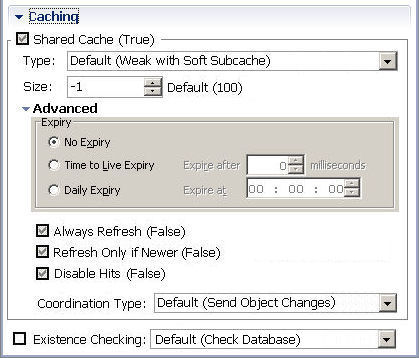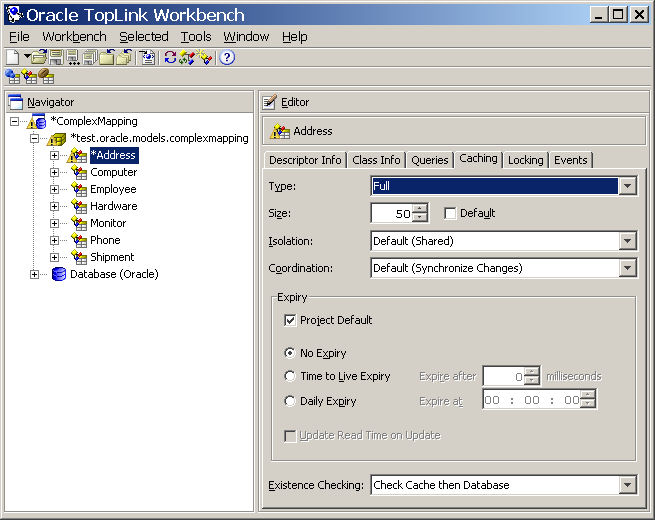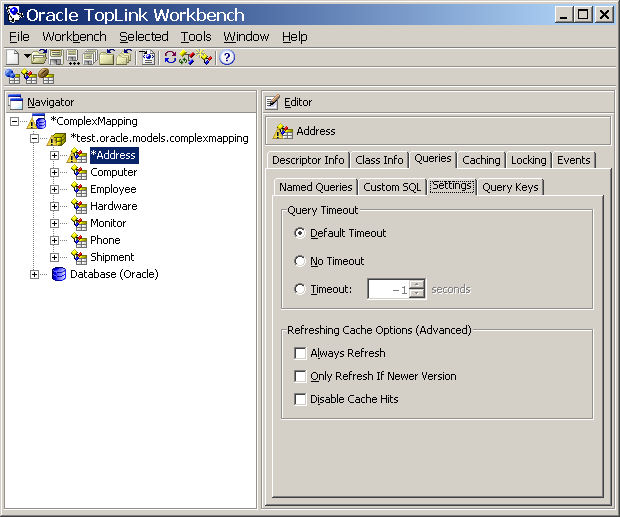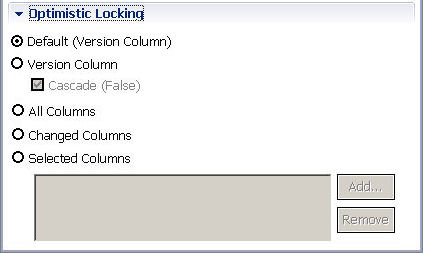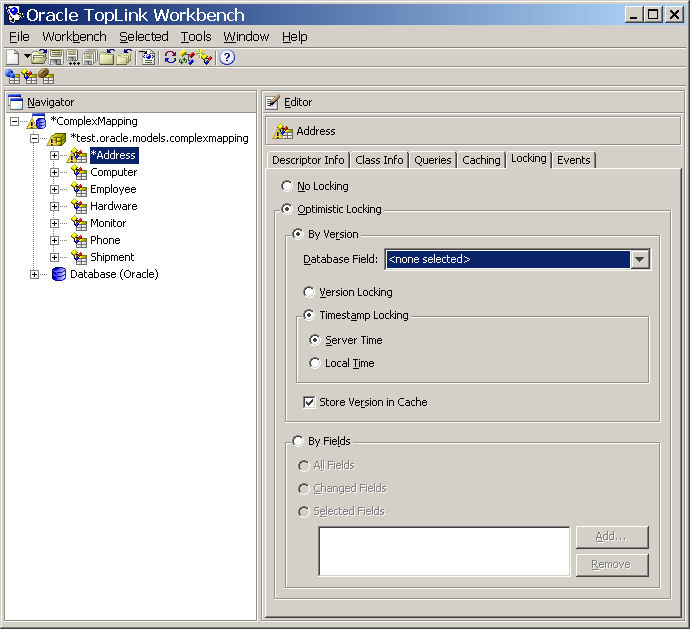Notice: this Wiki will be going read only early in 2024 and edits will no longer be possible. Please see: https://gitlab.eclipse.org/eclipsefdn/helpdesk/-/wikis/Wiki-shutdown-plan for the plan.
Difference between revisions of "EclipseLinkCachingAndLocking"
(→Optimistic Locking) |
m |
||
| (4 intermediate revisions by 2 users not shown) | |||
| Line 1: | Line 1: | ||
= Functional Specification: Dali Support for EclipseLink Caching and Optimistic Locking = | = Functional Specification: Dali Support for EclipseLink Caching and Optimistic Locking = | ||
| + | |||
| + | [[Talk:EclipseLinkCachingAndLocking | Feedback]] | ||
[http://bugs.eclipse.org/239137 bug 239137] - cache support | [http://bugs.eclipse.org/239137 bug 239137] - cache support | ||
| Line 56: | Line 58: | ||
** None | ** None | ||
* @ExistenceChecking supported in Entity and MappedSuperclass classes. | * @ExistenceChecking supported in Entity and MappedSuperclass classes. | ||
| − | ** Default (Check | + | ** Default (Check Database) - if the empty annotation is added, the default becomes Check Cache. See the second screen shot below |
** Check Cache -> ExistenceType.CHECK_CACHE | ** Check Cache -> ExistenceType.CHECK_CACHE | ||
** Check Cache then Database -> ExistenceType.CHECK_DATABASE | ** Check Cache then Database -> ExistenceType.CHECK_DATABASE | ||
| Line 62: | Line 64: | ||
** Assume Non-Existence -> ExistenceType.ASSUME_NON_EXISTENCE | ** Assume Non-Existence -> ExistenceType.ASSUME_NON_EXISTENCE | ||
* Shared Cache | * Shared Cache | ||
| − | ** What should we label this instead? | + | ** What should we label this instead? Possible options are 'Cache in L2 Cache' or 'Maintain in L2 Cache'. In the @Cache annotation it is just 'shared'. |
** If set to false then the panel is disabled and all Cache settings are removed. You will be left with @Cache(shared=false) in the java source. | ** If set to false then the panel is disabled and all Cache settings are removed. You will be left with @Cache(shared=false) in the java source. | ||
*Expiry | *Expiry | ||
| − | ** Should we follow the Mapping Workbench or more closely follow the new | + | ** Should we follow the Mapping Workbench or more closely follow the new EclipseLink annotations? The 'Time To Live Expiry' would add the expiry element to the Cache annotation. The 'Daily Expiry' would add the expiryTimeOfDay element to the Cache annotation. Potentially the radio buttons could be 'No Expiry', 'Expiry', 'Time of Day Expiry' |
'''Entity 'Caching' section''' | '''Entity 'Caching' section''' | ||
[[Image: EntityCaching.jpg]] | [[Image: EntityCaching.jpg]] | ||
| + | |||
| + | |||
| + | Existence Checking combo if the ExistenceChecking annotation or xml element exists, the default changes. | ||
| + | |||
| + | [[Image: ExistenceChecking.jpg]] | ||
| Line 83: | Line 90: | ||
=== Optimistic Locking === | === Optimistic Locking === | ||
| − | *[[Using_EclipseLink_JPA_Extensions_(ELUG)#Using_EclipseLink_JPA_Extensions_for_Optimistic_Locking|@OptimisticLocking]] supported in Entity and MappedSuperclass classes. | + | *[[Using_EclipseLink_JPA_Extensions_(ELUG)#Using_EclipseLink_JPA_Extensions_for_Optimistic_Locking|@OptimisticLocking]] annotation supported in Entity and MappedSuperclass classes. Corresponding eclipselink-orm.xml element is optimistic-locking |
* Type Options | * Type Options | ||
** Default (Version Column) | ** Default (Version Column) | ||
| Line 95: | Line 102: | ||
** If using Optimistic Locking with anything other than Version Column, the @Version annotation will be ignored (warning, not error, for this) | ** If using Optimistic Locking with anything other than Version Column, the @Version annotation will be ignored (warning, not error, for this) | ||
** If 'cascade' is set and type is not 'Version Column', warning that it is not supported. | ** If 'cascade' is set and type is not 'Version Column', warning that it is not supported. | ||
| − | ** If type is 'Version Column' there must be a mapping marked @Version. | + | ** If type is 'Version Column' or @OptimisticLocking is specified without a type, there must be a mapping marked @Version. |
| − | + | ||
| − | + | ||
| − | + | ||
| − | + | * If no @Version annotation exists the Default option will display 'Default (None) | |
| − | * | + | * If a Version annotation exists, the default option will display 'Default (Version Column) |
| − | * Default (Version Column) | + | |
Latest revision as of 14:51, 18 September 2008
Contents
Functional Specification: Dali Support for EclipseLink Caching and Optimistic Locking
bug 239137 - cache support
bug 239148 - optimistic locking support
Document History
| Date | Author | Version Description & Notes |
|---|---|---|
| 7-1-2008 | Karen Butzke | Draft |
Project overview
This feature covers entity/mapped superclass level caching and optimistic locking supported by the EclipseLink JPA extension.
Goals:
- Add JPA Details view widgets for the Cache, ExistenceChecking, OptimisticLocking annotations
- Add JPA Details view widgets for eclipselink-orm.xml cache, existence-checking and optimistic-locking elements
- Provide the appropriate defaults and validation for these settings
Concepts
Present any concepts relevant to the feature.
EclipseLink Cache annotation documentation
EclipseLink OptimisticLocking annotation documentation
Requirements / Functionality
Caching
- @Cache supported in Entity and MappedSuperclass classes.
- Cache Type options
- Default (Weak with Soft subcache)
- Weak with Soft Subcache -> CacheType.SOFT_WEAK
- Weak with Hard Subcache -> CacheType.HARD_WEAK
- Weak -> CacheType.WEAK
- Soft -> CacheType.SOFT
- Full -> CacheType.FULL
- Cache -> CacheType.CACHE - do we want to support this?? We didn't in the mapping workbench
- None -> CacheType.NONE
- Coordination Type
- Default (Send Object Changes)
- Send Object Changes
- Invalidate Changed Objects
- Send New Objects with Changes
- None
- @ExistenceChecking supported in Entity and MappedSuperclass classes.
- Default (Check Database) - if the empty annotation is added, the default becomes Check Cache. See the second screen shot below
- Check Cache -> ExistenceType.CHECK_CACHE
- Check Cache then Database -> ExistenceType.CHECK_DATABASE
- Assume Existence -> ExistenceType.ASSUME_EXISTENCE
- Assume Non-Existence -> ExistenceType.ASSUME_NON_EXISTENCE
- Shared Cache
- What should we label this instead? Possible options are 'Cache in L2 Cache' or 'Maintain in L2 Cache'. In the @Cache annotation it is just 'shared'.
- If set to false then the panel is disabled and all Cache settings are removed. You will be left with @Cache(shared=false) in the java source.
- Expiry
- Should we follow the Mapping Workbench or more closely follow the new EclipseLink annotations? The 'Time To Live Expiry' would add the expiry element to the Cache annotation. The 'Daily Expiry' would add the expiryTimeOfDay element to the Cache annotation. Potentially the radio buttons could be 'No Expiry', 'Expiry', 'Time of Day Expiry'
Entity 'Caching' section
Existence Checking combo if the ExistenceChecking annotation or xml element exists, the default changes.
For reference, 'Caching' tab from the MW
For reference, 'Refreshing Cache Options' section from the MW
Optimistic Locking
- @OptimisticLocking annotation supported in Entity and MappedSuperclass classes. Corresponding eclipselink-orm.xml element is optimistic-locking
- Type Options
- Default (Version Column)
- All Columns -> OptimisticLockingType.ALL_COLUMNS
- Changed Columns -> OptimisticLockingType.CHANGED_COLUMNS
- Selected Columns -> OptimisticLockingType.SELECTED_COLUMNS
- Version Column -> OptimisticLockingType.VERSION_COLUMN
- Validation
- Type is 'Selected Columns' but no columns are selected
- Selected Columns must be mapped and must not be primary keys
- If using Optimistic Locking with anything other than Version Column, the @Version annotation will be ignored (warning, not error, for this)
- If 'cascade' is set and type is not 'Version Column', warning that it is not supported.
- If type is 'Version Column' or @OptimisticLocking is specified without a type, there must be a mapping marked @Version.
- If no @Version annotation exists the Default option will display 'Default (None)
- If a Version annotation exists, the default option will display 'Default (Version Column)
For Reference, Locking tab from MW
API
Issues
This section lists the open issues that are still pending that must be decided prior to fully implementing this project's requirements.
| Issue # | Owner | Description / Notes | Decision |
|---|---|---|---|
Future Considerations
During the research for this project the following items were identified as out of scope but are captured here as potential future enhancements. If agreed upon during the review process these should be logged in the bug system.

